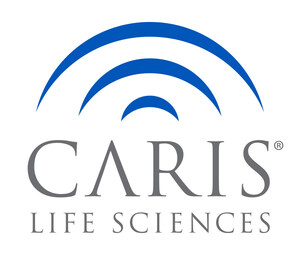Caris Life Sciences Research Yields New Molecular Insights into Rare Breast Cancers
Comprehensive Molecular Profiling Reveals Potentially Targetable Biomarkers in Metaplastic Breast Carcinoma and Malignant Phyllodes Tumors of the Breast
SABCS Presentations Provide Further Evidence of Utility of Caris Molecular Intelligence in Characterizing Rare Breast Tumors
IRVING, Texas, Dec. 9, 2015 /PRNewswire/ -- Caris Life Sciences® today announced the presentation of data at the 2015 San Antonio Breast Cancer Symposium (SABCS) from two studies in which Caris Molecular Intelligence®, the company's panomic, comprehensive tumor profiling service, was used to identify potentially targetable biomarkers in metaplastic breast carcinoma and malignant phyllodes tumors of the breast, two rare subtypes of breast cancer. The two data sets provide further evidence of the utility of molecular profiling to identify potential therapeutic targets in rare breast cancers.
In one study, comprehensive profiling of metaplastic breast carcinoma (MpBC) samples revealed frequent overexpression of the programmed death ligand 1 (PD-L1), a potential therapeutic target for a new class of drugs known as immune checkpoint inhibitors. In the second study, use of Caris Molecular Intelligence identified various molecular alterations in malignant phyllodes tumors of the breast, some of which are considered potentially actionable.
"Metaplastic breast carcinoma and malignant phyllodes breast tumors are extremely challenging for clinicians because there are few effective treatment options for women living with these rare malignancies," commented Zoran Gatalica, M.D., D.Sc., Executive Medical Director of Caris Life Sciences, and lead investigator in both studies. "By identifying potentially actionable biomarkers in these tumor subtypes, we hope our results lead to further investigation of treatment strategies that specifically target these molecular alterations."
Metaplastic Breast Carcinoma Study Highlights (P3-07-47)
MpBC is a rare subtype of breast carcinoma that comprises less than 1% of all breast cancers. MpBC tumors generally do not express estrogen receptors (ER), progesterone receptors (PR) or the HER2/neu protein, and are less responsive to conventional therapy compared to usual breast carcinomas, (UBCs) such as the ductal and lobular subtypes. In molecular terms, MpBC usually clusters with triple-negative breast cancer (TNBC), an aggressive type of breast cancer that is negative for ER, PR and HER2/neu, although patients with MpBC generally have a worse prognosis than those with TNBC.
Dr. Gatalica and colleagues presented an analysis of tumor samples from 132 patients with 38 histologically confirmed MpBCs and 94 UBCs. Of the UBCs, 44 were ER-positive, 33 were triple-negative, and 17 were HER2-positive. The investigators analyzed the samples via Caris Molecular Intelligence's multi-technology approach, which included DNA gene sequencing (Next-Generation Sequencing [NGS]), RNA analysis (Fragment Analysis), and protein expression analysis (immunohistochemistry [IHC]). Importantly, they detected PD-L1 expression on cancer cells in a significantly higher proportion of MpBCs (37%) than in the UBC cohort (6%) or in TNBC controls (14%) (p=3.7x10-5 and p=0.03, respectively). At the genomic level, numerous cases of MpBC had multiple genomic alterations; the most frequent genetic mutation was in the TP53 gene (14/24), similar to the TNBC controls (17/33). BRCA1 mutations were detected in two of 10 cases. Potentially actionable mutations included the PIK3CA gene, although these were rare. Among MpBC samples, there was a wide variance (0 to >50/mm2) in expression of PD-1 (the receptor for PD-L1) on tumor-infiltrating lymphocytes (TILs). Overexpression of EGFR was frequent in MpBCs (62%); however, investigators did not detect any mutations in this gene, including EGFRvIII.
"Published studies investigating metaplastic breast carcinomas for specific biomarkers of therapeutic response are rare, and are limited by their methodological approaches," noted Dr. Gatalica. "In our study, comprehensive profiling of a large cohort of this rare carcinoma highlighted the predominance of TP53 mutations, wild-type EGFR gene expression, a distinct increase in the proportion of PD-L1 expression in carcinoma cells, and PD-1 expression on tumor-infiltrating lymphocytes. Those latter properties can be exploited in clinical trials utilizing immune checkpoint inhibitors."
Malignant Phyllodes Tumor Study Highlights (P4-09-19)
Malignant phyllodes tumors are rare breast malignancies, representing 0.1% of all breast tumors. Patients with recurrent and metastatic malignant phyllodes tumors have few effective treatment options. In his presentation, Dr. Gatalica referred to recent trials indicating a potential for anti-angiogenic therapy in soft tissue sarcomas, which led his team to investigate these pathways in 35 malignant phyllodes tumors (including two cases with matched primary and metastatic tumors). The investigators conducted their analysis with Caris Molecular Intelligence, including gene sequencing (NGS and Sanger Sequencing), gene copy number analysis (chromogenic or fluorescence in situ hybridization [CISH or FISH]), whole genome RNA expression analysis (microarray assay), and protein expression analysis (IHC).
The RNA microarray assay showed consistent overexpression of genes involved in angiogenesis, including VEGFA, Angiopoietin2, VCAM1, PDGFRA, PTTG1, and CYP3A5, in all cases analyzed (n=5). The most common mutations included those of TP53 (50%) and PIK3CA (15%), while other mutations (BRCA1, BRCA2, RET, CDH1, MLH1, ATM) were rare, affecting single phyllodes cases. The two cases with matched primary and metastatic cancers harbored the same mutations in both sites (PIK3CA/KRAS and RB1 gene mutations, respectively). EGFR protein overexpression was observed in 25/26 (96%) of cases, with amplification of the EGFR gene in 8 (33%) of the cases. EGFR gene mutations were identified in two cases (8%), including one case with presumed pathogenic V774M mutation and one case with EGFRvIII mutation.
"Comprehensive multiplatform profiling identifies various molecular alterations in phyllodes tumors, some of which are potentially actionable," concluded Dr. Gatalica. "Our data suggest that anti-angiogenic therapy may be effective in patients with malignant phyllodes tumors of the breast. Through evaluation of the EGFR pathway, we discovered consistent protein overexpression but rare activating mutations. These findings will necessitate refinement in patient selection for clinical trials targeting these pathways."
About Caris Life Sciences®
Founded by David D. Halbert in 2008, Caris Life Sciences® is a leading biotechnology company focused on fulfilling the promise of precision medicine through quality and innovation. Caris Molecular Intelligence®, the company's healthcare information and comprehensive tumor profiling service with more than 80,000 patients profiled, provides oncologists with the most clinically actionable treatment options available to personalize cancer care today. Using a variety of advanced profiling technologies to assess relevant biological changes in each patient's tumor, Caris Molecular Intelligence connects biomarker data generated from a tumor with biomarker-drug associations supported by evidence in the relevant clinical literature. Since 2009, Caris Life Sciences has tracked clinical and outcome data for certain patients undergoing tumor profiling, and has observed that patients treated with drugs consistent with their tumor profile show a significant increase in overall survival. The company is also developing its ADAPT Biotargeting System™, a revolutionary and unbiased profiling platform with applications across therapy development, drug delivery, advanced diagnostics and disease monitoring. Currently being developed for cancer and other complex diseases, the ADAPT Biotargeting System is able to simultaneously measure millions of molecular interactions within complex biological systems in their natural state(s). Headquartered in Irving, Texas, Caris Life Sciences offers services throughout the U.S., Europe, Australia and other international markets. To learn more, please visit www.CarisLifeSciences.com.
SOURCE Caris Life Sciences
Related Links
WANT YOUR COMPANY'S NEWS FEATURED ON PRNEWSWIRE.COM?
Newsrooms &
Influencers
Digital Media
Outlets
Journalists
Opted In






Share this article